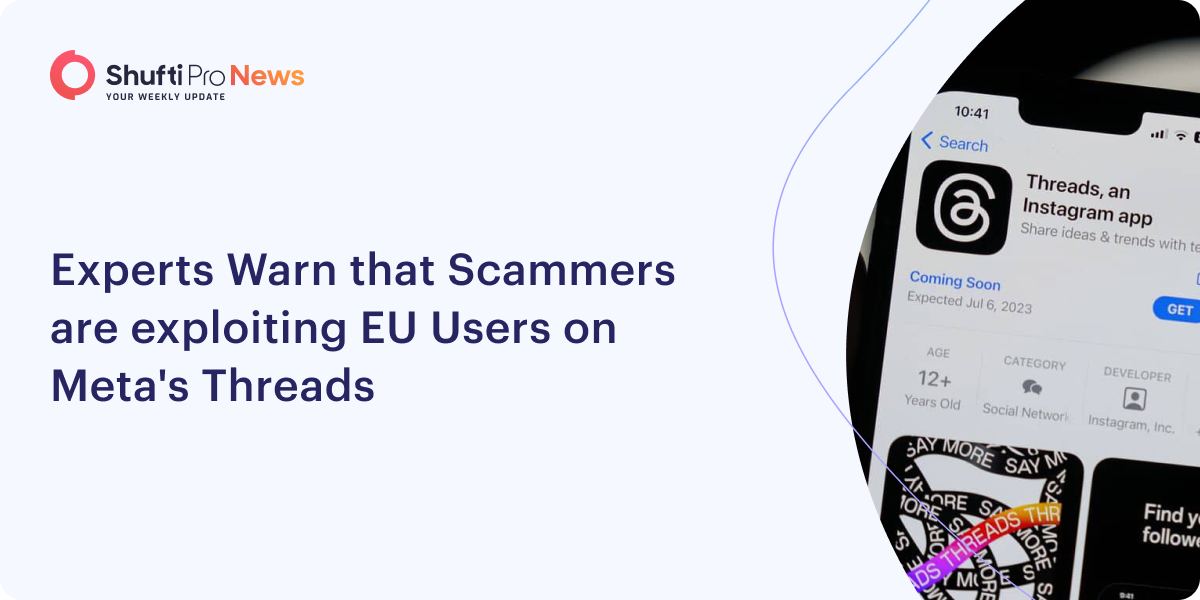Experts Warn that Scammers are Exploiting EU Users on Meta’s Threads

Meta’s Threads app has become the newest platform for cyber scammers to commit identity theft, create counterfeit cryptocurrency and exploit EU social media users.
Meta recently launched the Twitter clone app, Threads, on July 6th, managing to attract 100 million users in 5 days and become the most quickly subscribed social media application in history. Cybercriminals monitor all this as an opportunity to scam users. The Threads app is not accessible to European Union (EU) users, and scammers utilise its popularity to commit identity theft, steal sensitive information, and exploit them.
EU users are tricked into downloading fake Threads applications so the scammers can install a malware virus on their cellphones. This software assists them in getting access to the personal information of the users, including the credentials of their other social media accounts.
Nicolai Solling, the Chief Technology Officer at a cybersecurity firm said, “this has been exacerbated in the case of Threads, as the app remains unavailable in the EU. Consequently, some individuals within the EU have turned to unauthorised app stores as a means to gain access to the app, inadvertently putting themselves at risk. Social engineering attacks tend to exploit newsworthy topics that capture the broader society’s interest, and Threads is no exception. Malicious actors weaponise such subjects to manipulate unsuspecting individuals.” Solling also gave an example of exploiting trendy news and topics such as covid 19, cryptocurrency, Black Friday sales, and this time Threads.
In less than 3 weeks of the threads app’s launch date, scammers make various web pages and phishing mail to reap the personal information of the user. They also created a new cryptocurrency named “Thread Coin” and seduced users by promising significant followers by payment. Involvement in these scams is only a loss of money and personal data.
Cybersecurity expert, Sergey Belov stated, “Threads collects alot of information about the users, it requests to access various data including contacts, location, search history, etc. This is in line with Instagram’s privacy policies. Ultimately, security and privacy in the online environment are important issues, and each user must make their own decisions about which apps and services to use and whether to share personal information with them.”
The Vice President and Deputy Chief Privacy Officer for Policy at Meta, Rob Sherman, posted on the Threads addressing concerns raised after its launch. He discussed the privacy labels on the threads as the same as the other application that came under the Meta umbrella. The limited data is only collected by the application that is mentioned. He posted, “how we landed on Threads’s app store privacy labels. The labels are similar to the rest of our apps, including Instagram, in that our social apps receive whatever info (including the categories of data listed in the App Store) you share in the app. People can choose to share different kinds of data. Meta’s privacy policy, and the Threads supplementary privacy policy, are the best resources to understand how Threads uses and collects data.”
Meta has been launched in more than 100 countries but is still unavailable in the EU, and the replica apps are proliferating. Noncompliance with EU regulations curbing the official launch of the Threads app and scammers exploit the anticipated EU social media users.
Sherman addressed this issue by stating, “The app does meet with the GDPR obligations of the EU today, and “the face of this uncertainty.” However, sources in Meta told,“It is understood that the main issue was the implementation of the EU’s Digital Markets Act, which contains provisions on sharing data across different platforms. As a result of this, Meta is still waiting for further clarification from the European Commission on how the regulatory framework will be implemented before considering the next steps.”
Multiple EU users utilising the VPN to access the Threads app. It becomes vulnerable to scammers and risks their data. Although Meta has confirmed that they are blocking such efforts but it is still not a solution to protect EU social media users from falling for fake Threads app scams.

 Explore Now
Explore Now













